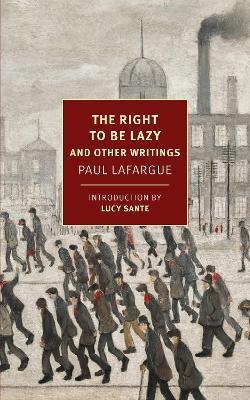
The Right to Be Lazy - And Other Writings (New York Review Books Classics)
Publisher,New York Review of Books
Publication Date,
Format, Paperback
Weight, 181.44 g
No. of Pages, 121
Collection of stories by Paul Lafargu including The Right to Be Lazy; A Capitalist Catechism; The Legend of Victor Hugo and Memories of Karl Marx. Paul Lafargue's masterpiece, The Right To Be Lazy, at once funny and serious, witty and profound, elegant and forceful, is a logical expansion of The Right to the Pursuit of Happiness announced by Thomas Jefferson in the Declaration of Independence. It was not only extremely popular but also brought about pragmatic results, inspiring the movement for the eight-hour day and equal pay for men and women who perform equal work. It survives as one of the very few pieces of writing to come out of the international socialist movement of the nineteenth century that is not only readable-even enjoyable-but pertinent. Born in Cuba on January 15, 1842, Lafargue was a child of the New World, although he was a citizen of France. Educated and trained as a physician, he found his true calling as a revolutionary, a speaker, writer, agitator, and organizer on behalf of French working people. He took an active part in the Paris Commune and was one of the founders of the party of revolutionary socialists in France. He held public office and represented the French workers at international congresses. He also spent time in French jails--
About the Author
Lucy Sante is the author of Low Life, Evidence, The Factory of Facts, Kill All Your Darlings, Folk Photography, The Other Paris, and most recently, Maybe the People Would Be the Times. She translated Félix Fénéon’s Novels in Three Lines and has written introductions to several other NYRB Classics, including Classic Crimes by William Roughead and Pedigree by Georges Simenon. A frequent contributor to The New York Review of Books, she teaches writing and the history of photography at Bard College.
Alex Andriesse’s stories, essays, and poems have appeared in Granta, The Review of Contemporary Fiction, Prodigal, and Literary Imagination. He has translated several works from Italian and French, including Roberto Bazlen’s Notes Without a Text and Other Writings and François-René de Chateaubriand’s Memoirs from Beyond the Grave, 1768–1800 (an NYRB Classic). He is an associate editor at New York Review Books.
- Dimensions : 5.02 x 0.39 x 7.97 inches

